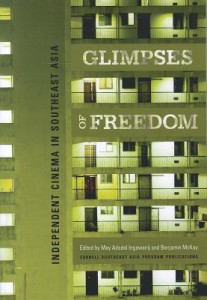Glimpses of Freedom
Independent Cinema in Southeast Asia
Sous la direction de May Adadol Ingawanij et Benjamin McKay


Moyenne des votes : ![]()
| 0 | vote | |
| 0 | vote | |
| 0 | vote | |
| 0 | vote |
Votre vote : -
Description de l'ouvrage:
Since the late 1990s, a vivid new sphere of cinematic practice in Southeast Asia has emerged and been identified as independent. What exactly does this term mean in relation to the way films and videos are made, and the way they look? How do issues of festival circulation, piracy, technology, state and institutional power, and spectatorship apply to practices of independent cinema throughout the diverse region? The authors who speak in this volume--contemporary filmmakers, critics, curators, festival organizers--answer these questions. They describe and analyze the emerging field of Southeast Asian cinema, which they know firsthand and have helped create and foster.
Glimpses of Freedom is the outcome of a project collaboratively conceived by a new generation of scholars of cinema in Southeast Asia, inspired by the growing domestic and international visibility of notable films and videos from the region. Contributors include internationally esteemed independent filmmakers, critics, and curators based in Southeast Asia, such as Hassan Abd Muthalib, Alexis A. Tioseco, Chris Chong Chan Fui, and John Torres. International scholars such as Benedict Anderson, Benjamin McKay, May Adadol Ingawanij, and Gaik Cheng Khoo contextualize and theorize Southeast Asia's "independent film cultures." The interaction between practitioners and critics in this volume illuminates a contemporary artistic field, clarifying its particular character and its vital contributions to cinema worldwide.
Contributors
Benedict Anderson, Cornell University; Tilman Baumg rtel, Royal University of Phnom Penh; Angie Bexley, College of Asia and the Pacific (Australian National University); Chris Chong, independent film director, Malaysia; Hassan Abd Muthalib (artist, writer, and film director), Universiti Teknologi MARA Malaysia; Eloisa May P. Hernandez, University of the Philippines, Diliman; May Adadol Ingawanij, Centre for Research and Education in Arts and Media, University of Westminster; Gaik Cheng Khoo, Australian National University; Mariam Lam, University of California-Riverside; Benjamin McKay (1964-2010), writer, critic, and academic, Kuala Lumpur; Vinita Ramani Mohan, Access to Justice Asia LLP; Alexis A. Tioseco (1981-2009), film critic, curator, and lecturer, Philippines; John Torres, musician and experimental filmmaker, Philippines; Chalida Uabumrungjit, Thai Film Foundation and Thai Short Film and Video Festival; Jan Uhde, University of Waterloo, Ontario, Canada; and Yvonne Ng Uhde, editorial board, KINEMA journal, University of Waterloo
À propos des auteurs :
Benjamin McKay was a writer, critic, and academic based in Kuala Lumpur. He had just completed his PhD research on 1950s and 1960s Malay cinema when, on July 18, 2010, he died of a cardiac arrest. As a lecturer in Film Studies at Monash University Malaysia, he was much loved by his students. As a critic, Benjamin wrote a monthly column for the Malaysian magazine Off The Edge and was a regular contributor to Kakiseni and the Southeast Asian cinema online journal Criticine.
Revue de Presse:
Glimpses of Freedom draws on a plurality of perspectives and hence styles of writing and analysis in order to create what feels like a dialogue between the various authors.... Some of the authors' frank explanations regarding their implications in their topics of study... lend their essays the intimate perspective of primary witnesses. In addition, the relatively short length of the essays, resonating with the title of the volume, give the reader provocative glimpses of independent Southeast Asian filmmaking.
Journal of Asian Studies
For the past decade, I have been trying to understand the region's cinema and decide whether it has unique traits or if it's in a perpetual identity crisis. Was there really a new movement around here? 'Independence' seems like a utopian word amid the economic and political struggles in Southeast Asia, but many of us practice independence, partly out of necessity. This book is a significant contribution in both answering my questions about the cinema around me and revealing to me a glimpse of the future.
> Sur un thème proche :
Southeast Asia on Screen (2020)
From Independence to Financial Crisis (1945-1998)
Dir. Gaik Cheng Khoo, Thomas Barker et Mary Ainslie
Sujet : Countries > Southeast Asia
The Third Sex (2025)
Beyond a Gender Binary in Thai Culture and Films
Sujet : Countries > Southeast Asia
Silver Screens and Golden Dreams (2024)
A Social History of Burmese Cinema
Sujet : Countries > Southeast Asia
Thailand, Western Cinema, and Imagery (2024)
Misrepresentation, Exoticisation, and Reclamation
Sujet : Countries > Southeast Asia
The Archival Afterlives of Philippine Cinema (2024)
Sujet : Countries > Southeast Asia
Independent Filmmaking in South East Asia (2021)
Conversations with Filmmakers on Building and Sustaining a Creative Career
Sujet : Countries > Southeast Asia
Postcolonial Hangups in Southeast Asian Cinema (2020)
Poetics of Space, Sound, and Stability
de Gerald Sim
Sujet : Countries > Southeast Asia
Genders and Sexualities in Indonesian Cinema (2016)
Constructing gay, lesbi and waria identities on screen
de Ben Murtagh
Sujet : Countries > Southeast Asia